Hepatitis B Vax: Testing Involved Only 147 kids & 5 days of safety monitoring! - Aaron Siri Part 2
Watch the full interview: https://rumble.com/v2ki7g2-aaron-siri-part-1-why-are-vaccine-manufacturers-the-most-protected-companie.html?mref=1bxo9j&mc=69gy3
Part 1 clip Aaron Siri: https://rumble.com/v2avs6m-7.7-percent-of-10-million-v-safe-users-reported-needing-medical-care-after-.html?mref=1bxo9j&mc=69gy3
Part 2 Aaron Siri:
Previously, in part one of my interview with Aaron Siri, managing partner at Siri and Glimstad, he broke down how vaccine manufacturers secured unprecedented protections from liability three decades ago.
How the Vaccine Paradigm Has Led to Medical Coercion and Conflicted Health Agencies
American Thought Leaders
AMERICAN THOUGHT LEADERS
JAN JEKIELEK
“I was always told that vaccines are safe. And if a product is safe, why do you need to give the manufacturer … essentially immunity to liability for the injuries that that product causes? Because if it’s safe, certainly in the way that our public health authorities project it safe to the public, there shouldn’t be any injuries, or there should be one in a million, as you often hear.”
Related Coverage
Aaron Siri (Part 2): How the Vaccine Paradigm Has Led to Medical Coercion and Conflicted Health Agencies
“COVID vaccines didn’t enter into a vacuum. They were rolled into a very long established paradigm and way things are done,” says Siri. “They had a narrative around natural immunity that they determined fit in with their policy. And then the studies followed to make it fit.”
In part two, we discuss natural immunity from COVID-19 and what he discovered in the clinical safety trials of other vaccines, such as one of the Hepatitis B products: “147 kids. Five days of safety monitoring after injection. There’s no indication there was a control group,” says Siri.
“COVID-19 vaccines—they were called ‘rushed.’ They said the clinical trials were rushed. They said development was rushed. But the reality is the clinical trials for the COVID-19 vaccines that the average American received, compared to the clinical trials for almost every childhood vaccine, were the most robust studies that have been done on vaccines.”
We also look at the conflicts of interest between America’s health agencies and pharmaceutical companies.
“Think about this business model. You have a vaccine. You can’t be sued for harms. You have a guaranteed market because kids are required to get it for school. And your health agencies promote it for you and defend against any harm,” says Siri.
Missed part one? You can watch it here.
FULL TRANSCRIPT
Jan Jekielek:
You’re flipping the way I’ve been thinking about all of this on its head. Let me explain why. You have all these doctors out there that are saying, “I was doing early treatment, I was saving people. My hospital stopped me. I had better results than hospital protocols. They stopped me, they did not let me.” Doctors were in tears.
Dr. Paul Marik, who created the sepsis protocol used around the world, couldn’t do his work. Their world has been shattered in many ways. Their whole paradigm and their view of medicine has changed. You’re telling me that this has happened in the past, just on a much smaller scale, and that what we’ve seen is not that different. Is this what you’re telling me?
Aaron Siri:
From my vantage point, what is happening with the COVID vaccine is not very different from what has happened with other vaccines in the past. The difference is the public’s interest in this particular vaccine and also the media’s willingness to cover alternatives, I’ll call it, or the views of those that are not just in lock step with pharma and the health agencies involved with these products.
I just have to stress these are medical products sold by pharmaceutical companies for profit that have immunity to any injury. They’re not given by Moses at Sinai. They have no magical properties. They’re just a medical product. They have a certain safety profile and a certain efficacy profile. There’s a reality to that. And then, there’s what you’re taught to think. Those are the two things.
With that said, COVID vaccines didn’t enter into a vacuum. They were rolled into a very long established paradigm and way things are done with regards to vaccines in America. People are shocked that you can’t sue a COVID manufacturer for injuries from their vaccine. Doesn’t that create a moral hazard?
That disincentivizes them from doing a proper clinical trial because their interest is to make as much money as possible. That disincentivizes them from studying safety. Sure it does, of course it does. But that’s the same with every other vaccine. And those vaccines are given to babies who can’t talk, who can’t describe their symptoms, and it’s given to a very small cohort. And it’s rolled out over time.
Mr. Jekielek:
But presumably because you will see a safety signal early on in that small cohort, you can stop the use, which has obviously happened.
Mr. Siri:
See a signal where?
Mr. Jekielek:
Well, you tell me.
Mr. Siri:
Let’s step all the way back then, and let’s just look at product safety. We talked about this a lot earlier when we started here, but there are basically two ways you can assure product safety. The way you really assure it is letting class action and product liability attorneys sue the manufacturer if their product has a problem, if it has an efficacy issue or it has a safety issue.
That is how you assure products are safe in America. That is what makes products safe in America. That is why your car is safer. That normal market force has gone away. All the class action attorneys, all the product label attorneys have been neutered. They can’t do anything. They have no incentive to sue the pharmaceutical companies to make them safer.
It is not only the suits that assure the products are safer, it is the threat. It is the potential of those suits, of that liability that assures the products are safer. So, you have taken away the primary way we can really assure product safety in this country, and it has been gone since 1986.
There’s a secondary way we assure products are safe in America. It’s a far weaker way, and that is regulatory oversight. There are regulators, and even in the car industry, there are regulators. They do some good. But in this case those regulators are completely conflicted for two reasons.
Number one, the very same department of the United States government, the Department of Health and Human Services, that is the department under which you have the CDC, the FDA, the NIH, and go down the list of over 20 health agencies, they all live in that one department. That department is responsible for promoting vaccines, and yet, they also made it responsible for the safety of vaccines. Those two things are in conflict.
You tell an agent’s department to promote this product, and then you tell them to ensure it’s safe. Finding any safety issue undermines the promotion function. That is why whenever there has been a department in the United States government that is responsible for promoting an industry, the Congress has taken away the safety function.
The Department of Transportation is responsible for promoting aviation. That’s why the NTSB was created, the National Transportation Safety Board, completely independent of the Department of Transportation. They’re completely independent. They are responsible for safety.
Similarly, for nuclear power, there’s a Department of Energy that promotes nuclear energy. There is a completely separate department, completely independent, that is responsible for regulating nuclear power plant safety. But when it comes to vaccines, it’s one department. That’s the first problem.
The second problem, and I don’t know of any other product that has this problem, and I mentioned this earlier. In 1986 Congress gave vaccine manufacturers immunity for injuries caused by their vaccine products, not just the three that were hurting people back in ’86, but for any of the future ones. And if you go look at a child’s schedule, there’s a lot more, it’s a gold rush in many ways.
One thing provided an avenue for people to get some financial relief, and that was creating the Vaccine Injury Compensation Program, which is within HHS. And who do you sue? I mentioned this earlier. You sue the secretary of the Department of Health and Human Services. That’s what our firm does every day. We sue on behalf of people injured by vaccines.
And when we do, we literally name the plaintiff, their name, versus the name of the Secretary of the Department of HHS in his capacity as the secretary of the Department of Health and Human Services. The very same department that’s responsible for safety. Think about that. You are making it so that if the CDC or FDA or NIH published any study that shows a Hep B vaccine causes X issue or any other vaccine has a problem, you have just created the evidence against yourself.
HHS will have just created evidence to indict itself that then makes it liable in vaccine court. There’s an entire specialized department in the Department of Justice of attorneys who fight against people injured by vaccines bringing a claim. Before we talk about that for a second, I just want you to really put that in perspective. It’s so bad.
Our health agencies are really, in many ways, they’re hopelessly conflicted. They are in a position where they focus on the promotion function really well and the defense function really well. That has subsumed what they do around the safety function, which has basically become a PR issue. That’s what it is.
Anytime they do safety studies, they’re never studies to really show that it’s safe. They are reactionary to a PR issue around a vaccine. If you look at the vaccine safety literature, you’ll find that. When the COVID vaccine came around, it loaded onto this same exact paradigm. Our health agencies for decades now have been so attuned to just promoting vaccines and defending vaccines that the COVID vaccine just slots right into that.
Mr. Jekielek:
What about this whole natural immunity? This is one of the things that made me question a lot of things early on, when natural immunity was denied, that it was a thing for this disease. Whereas, for every other coronavirus it was fine. Early on I wondered, it did come from China and it likely came from a lab, is this maybe the reason?
I don’t know. But very quickly we found out that natural immunity was a thing, in fact, and it was very effective. Was it just standard operating procedure for the promotion arm of these agencies to basically deny natural immunity?
Mr. Siri:
You found out that natural immunity, which has kept humans alive forever, is a thing?
Mr. Jekielek:
Yes, well no. I mean the default.
Mr. Siri:
Do you see what I mean? This is the narrative that is being pushed on the American public, this idea that natural immunity is something that needs to be verified, that needs health authority approval, with all of our tax money in the health agencies and billions of dollars of pharmaceutical company revenue every year. That machine is able to turn and there’s really no money on the other side pushing back on any of that.
So, they can push almost any narrative, frankly, with the exception of brave journalists like yourself. And I mean that. You and many others who are willing to actually look critically at these health agencies despite the potential costs that you might pay for doing that.
But to answer your question, do they just deny natural immunity? I found the way that the health authorities dealt with natural immunity to be not uncommon, in that they decided on the narrative they wanted. And then, they have a review process for the studies they put out. The MMWR [Morbidity and Mortality Weekly Report], is the CDC’s equivalent of a science journal. I call it a newsletter, but they call it a science journal.
It doesn’t go through peer review, it goes through CDC’s clearance process. Everything that ends up in the MMWR then gets touted all over the news. CNN and MSNBC pick this up like it’s the holy grail of what is reality in terms of scientific knowledge. The MMWR is used as a tool to assure that CDC’s policy is then reflected in the science.
Their policy comes first. There’s a clearance process to review all studies published in MMWR. That’s not me saying that, you can look it up. The CDC’s available literature explains this. And only if the quote unquote, study, the science, comports with their policy, does it get published.
So, with natural immunity, you’re asking, “Is this standard operating procedure?” In that regard it is. They had a narrative around natural immunity that they determined fit in with their policy, and then the studies followed to make it fit.
There were studies involving millions of people out of Israel and other places that showed natural immunity was more robust than vaccine immunity. And the CDC concocted this ridiculous case control study of one little small data set that they claim showed that natural immunity may not be as good as vaccine immunity.
That study drew the ire of a lot of scientists, because they actually read it and they thought about it, because it affected them, and not some infant. It affected whether they could keep their job, and whether they could keep going to work if they didn’t want the shot. They actually started looking at that science and it’s amazing what happened, isn’t it?
Mr. Jekielek:
So, what happened?
Mr. Siri:
Public outrage and public outcry. People were like, “What are you doing, CDC? Don’t you see all these studies?” We had an exchange with the CDC. There’s a formal process where you can petition the CDC under a particular section of law and they must respond. They have to.
On behalf of ICAN [Informed Consent Action Network], we submitted one of these formal requests. You can go to ICAN’s website and look at this. It’s an amazing exchange in my opinion. We did this early on. We submitted a request to the CDC and we said, “Look, here’s all these studies that show that natural immunity is more robust than vaccine immunity in terms of preventing transmission, in terms of hospitalizations, and in every category.”
“So, why does your guidance say if you’re vaccinated, it’s okay for you to X, Y, Z. You can have your civil liberties, and you can participate in American life. But if you have natural immunity you can’t participate in American life.” Obviously, it’s a legal issue and it’s a civil rights issue. Those CDC guidelines affected whether you can go into a restaurant, whether you can have a job, and whether you can go to school. They made it a legal issue.
That’s why we formally petitioned them and said, “You have brought this out of the realm of just science and you’ve made this something that attacks the civil rights and individual rights of everybody in this country. So, answer to this. How in the face of all of this data can you say that vaccine immunity is okay for you to participate in American life, but natural immunity is not sufficient?”
They responded by ignoring all that data and citing that one study of these few hundred people that wasn’t even a cohort study. I don’t want to get into epidemiology. Every epidemiologist who’s got any integrity tells you this one study is garbage and it’s ridiculous. And even if it happened to be correct, it’s a chance finding, and it’s of no weight in the face of the studies involving millions of people. But yet, that’s what they responded with. We then replied to them, and they never responded to our reply pointing out the ridiculous nature of this, and you can read that exchange.
Mr. Jekielek:
Hey everyone, I’ve got a special announcement. We’re launching a Sunday watch party series. Many of you have told us that you want to share some of our best episodes with your friends and family so they can be more informed about what’s going on. So, every Sunday at 7:30 PM Eastern, we’ll be re-premiering some of our best “American Thought Leaders” episodes for subscribers and non-subscribers alike.
It’s free to everybody. If you have a suggestion for the next “American Thought Leaders” episode that you’d like to see for our Sunday watch party, please tag us on Twitter at #ATLSundayWatchParty. Again, that’s #ATLSundayWatchParty, Or email us at atl@epochtimes.com. I look forward to seeing you all on the live chat this Sunday.
Mr. Jekielek:
At this point I have to go back to this incredibly disturbing thing you told me earlier, which was that there are really short safety study times for childhood vaccines. What do you mean by a very, very short time period? I’ll tell you why I’m asking, because people typically say, “It takes 10 years or many years to develop a vaccine. People said, “There’s no way they’ll be able to develop these COVID-19 shots because how will we know? These safety studies take a long time. Please explain to me what you’re saying here.
Mr. Siri:
The COVID-19 vaccines, they were called rushed. They said the clinical trials were rushed. They said the development was rushed. But the reality is the clinical trials for the COVID-19 vaccines that the average American received were, compared to the clinical trials for almost every childhood vaccine, were the most robust studies that have been done on vaccines. Let me tell you why.
One, when people talk about other vaccines and they say, “Oh, it took a decade to develop it,” they’re not talking about the clinical trial done in human beings to assure that it was safe and effective. They’re talking about the timeline it took to develop the technology needed to create the vaccine. Take Recombinant Hep B vaccines, which are DNA vaccines. It took a long time to create that technology of taking the DNA from hepatitis B and then putting it into a yeast, growing it in yeast, and getting that DNA to multiply and then injecting it in. It took a long time to create that technology.
But that’s different from how long the clinical trial then assessed its safety and efficacy before you licensed it. When it comes to COVID vaccines, the technology needed to actually create the mRNA vaccines, that also had been going on for decades. In the same way, it took over a decade to create the recombinant technology to create the hepatitis B vaccines, as an example.
What’s critical though, is not how long it takes to create the technology. It’s that once you’ve created it, what is its effect on human beings? That is what’s critical. And how do you assess that? You assess it in a clinical trial where you give one group of people the product, the experimental product, and you don’t give it to another group of people. Instead, you give them a placebo control, a saline injection. And then, you compare the total health outcomes between those groups. That’s how you study the efficacy and how you study the safety.
There are three critical components when you think about a clinical trial and assessing whether it was a good clinical trial? Was it able to really assess those two things, efficacy and safety? The first component is how long did it review safety in the clinical trial? COVID vaccine trials reviewed safety for over six months.
The second thing you looked at, how many people are in the trial, meaning how well powered is it? The more people in the trial, the more likely you are to pick up a safety signal or an issue. That’s the second factor you look at.
The third factor you look at is what did the control group receive, or was there a control group? Because if you don’t have one that’s basically getting something inert, or something that has a clearly defined, well known, well established safety profile, if you don’t have that, what are you comparing?
If I compare giving you anthrax with another anthrax, or giving you arsenic with giving you arsenic, or compare arsenic with shooting you, maybe they’re equally as safe. They both cause the same amount of harm. But that’s why you need a proper control group.
For the first thing, with COVID vaccines, for six months of the safety review period, we had 30,000 people, and they had a placebo control group for an average of two months. We know that at some point they vaccinated the placebo control group, but at least they had one for an average of two months.
Let’s look at the hepatitis B vaccine given to babies. There are two hepatitis B vaccines given to babies when they’re first born; first day of life, and then at one month and at six months. One is made by Merck, Recombivax HB, and one is made by GSK, Engerix-B. Before I tell you how long the safety was, before I tell you how many kids were involved, and before I tell you what the control was, let me just say that what I’m about to tell you, if you told me what I’m about to tell you, I’d say no way, I don’t believe it.
Here it is; 147 kids, five days of safety monitoring after injection. There’s no indication there was a control group. COVID vaccines have over six months of safety review in a clinical trial that was relied upon by the FDA to license it. Hepatitis B vaccine given to a newborn had five days of safety monitoring after injection. There were 30,000 people in the COVID 19 vaccine clinical trial for Pfizer, even more for Moderna. Or maybe I have that backwards, one of the two. One had about 45,000. For the Hep B vaccine, it doesn’t appear there was even control. Even if there was, what are you going to get with 147 kids for data, unless the injury is like one in five, one in three kids?
Mr. Jekielek:
You’re right, it does strain credulity.
Mr. Siri:
For anybody watching this, don’t take my word for it. Go to the FDA website. In fact, can I show it to you right now?
Mr. Jekielek:
Yes, please.
Mr. Siri:
You can go to FDA licensed vaccines. Go to Google and you can search for it, or go to DuckDuckGo, or your search engine of choice and search for FDA licensed vaccines. The first result will be a page on the FDA website called vaccines licensed for use in the United States. And I’ve actually got it open right here.
I’m going to scroll down to hepatitis B and Recombivax HB. I’m going to click on it, and then I’m going to click on the package insert. In the package insert you then go to section 6.1. Section 6.1 in all these package inserts is the clinical trials experience. You know how when you get a drug, there’s a piece of paper inside, and you open it up?
Section 6.1 is where the FDA requires the manufacturer to explain the clinical trial experience. That’s where it will tell you what the clinical trial is. I will read to you exactly what it says regarding the clinical trial in infants. Again, this is on the FDA website. This is Merck’s package insert for the Recombivax HB hepatitis B vaccine approved by the FDA.
It says, “In three clinical studies, 434 doses of Recombivax HB five micrograms were administered to 147 healthy infants and children up to 10 years of age who were monitored for five days after each dose,” period, end quote. Now, I will tell you when I saw that and when the folks at ICAN saw that, we also said, “It cannot be, it can’t be.” So, we FOIA’d the FDA for the actual clinical trial reports submitted to license both this vaccine and Engerix-B, and we have them.
I can confirm to you the monitoring for safety was five days after injection for a product given to a newborn, a one-month-old, and a six-month-old. So yes, I think the word I said was ridiculously short. Yes, I stand by that. I would say five days is ridiculously short.
And by the way, the other Hep B vaccine, Engerix-B, for the safety review period, and again, everybody can look this up just like I did for Recombivax HB—four days of safety monitoring after the shot. Four days. These are the only two shots that a newborn can get in America. That’s the first shot they get in life. So yes, I’d say ridiculous might be too soft of an adjective to describe that safety review period.
And again, we FOIA’d the FDA, we have the clinical trial documents for both of these vaccines, just like we did for the Pfizer clinical trial docs, and it is that safety review. In fact, on behalf of ICAN, we have actually filed a formal petition with the FDA to either do a proper clinical trial of this product or withdraw the licensure. They have six months under the law to respond. That six months has long come and gone. Despite our constant follow up, they have not given us a formal response.
We will soon be suing them in federal court over this exact issue. Either do the proper clinical trial because Congress said you are only to license products that are proven as safe and effective. That clinical trial cannot do that. How long do you need to review safety? How many kids, and what should the control receive? There is probably a gray area, but four or five days, that is definitely in the area that is not sufficient. That is probably why, despite it being well over a year at this point, the FDA has no response to our formal petition. Because what are they going to say? How do you justify that?
Mr. Jekielek:
Has anyone tried to justify it to you?
Mr. Siri:
I’ll tell you the answer because I pondered this for a long time. It really troubled me. My presumption is that most people in quote, unquote, public health, are good people. How could the FDA have done this? Why would the FDA have done this? It doesn’t make sense.
The best I could come up with is the following. When you look back at the ’80s and ’90s when pretty much half of the vaccines on the current childhood schedule were added, and in the early 2000s when the most of the rest of them were added, when you look at the people who sat on the FDA and CDC vaccine committees, many of them had serious pharma conflicts.
Many of them were consultants, and many of them worked for pharma. The very people who were effectively deciding whether or not the FDA and CDC should license the product on the FDA side and the CDC side, and recommend them on the child schedule, were highly conflicted.
I’m not saying they’re bad people. I’m just saying that probably clouded their judgment. They were of the motto, “Vaccines are the holy grail.” I don’t want to make excuses for them, I just don’t know. By the way, that’s not me saying that these folks had high conflicts with pharmaceutical companies.
In 2000, there was a Congressional oversight committee investigation into the FDA and the CDC vaccine committees. They found that the majority of the members had significant ties to pharmaceutical companies. Some of them were receiving seven figures. They were consultants, and there were all kinds of issues.
I recently deposed an individual, who is actually the head of one of the four safety systems at the CDC, she runs it. This doctor also sat on the FDA or CDC vaccine committee from 1991 to 2000. I had an opportunity to depose her. Before the deposition, we looked at all her published studies.
When we looked at those published studies, we found studies that reflected that at the same time she was sitting on the FDA and CDC vaccine committees and voting on these products, whether they licensed them or recommended them, she also had significant conflicts with those same companies disclosed in her peer review studies.
I’m not the first one to raise this issue. That congressional report raised it in 2000. Another report by the HHS Inspector General in 2008 raised it again. This same doctor that I just told you who is the head of one of the safety systems at the CDC, is also on the Vaccine Safety Monitoring Board of the Pfizer COVID vaccine.
She presents to ACIP [Advisory Committee on Immunization Practices], she’s the head of one of their safety systems. And at the same time she’s paid by Pfizer to be on their quote, unquote, independent vaccine safety monitoring board, overseeing the safety of the COVID 19 vaccine during its clinical trial. That board is effectively five people, and I think they added two people over time. But she was the vaccinologist on that committee. They have other disciplines, epidemiologists and so forth, but she was the vaccinologist.
She was the person that this country was relying upon, basically, to assure the safety of the COVID-19 vaccine while the clinical trial was rolling out. This committee is supposed to be independent. Not only was she part of the head of the CDC safety system while she had that position, directly before being on the independent Data Safety Monitoring Board for the Pfizer COVID-19 vaccine, guess who she was a consultant for? Pfizer.
When I think of an independent Data Safety Monitoring Board, I don’t really think of it as having the vaccinologist on it directly before being a consultant for the very company that you’re now supposed to be independently evaluating for the safety of the clinical trial, and at the same time having all these conflicts vis-a-vis the CDC. That’s just me.
Mr. Jekielek:
The thing that really jumps out to me right now is that these types of conflicts have lasted for a long time and clearly not enough has been done to change that reality.
Mr. Siri:
Our health authorities have all our money, it’s called taxes. They have billions of our dollars, and they deploy it to tell the public, safe and effective, safe and effective. That’s all they tell you pretty much, over and over and over and over again. They use the MMWR to create science studies, and otherwise, they don’t engage in doing any studies other than those that seek to affirm their policy objectives.
And then, you have the pharmaceutical industry that’s a revolving purse of billions of dollars every year selling these products. They have really great PR firms down on Park Avenue in Manhattan. They do an exceptional job for them. You have the pharmaceutical industry that pumps billions of dollars every year, and that is getting billions of dollars. They have the health agencies, and they are all on the same page.
Who is on the side of vaccine safety? Who’s assuring it? Again, normally it would be the product liability lawyers pushing back on pharma, but that doesn’t exist. Or it would be the regulatory agencies pushing back on the industry, which doesn’t exist. Who’s there? Who is there assuring the safety of childhood vaccines?
There are over 1400 pharma lobbyists in Congress. How many vaccine safety lobbyists are there? Zero, as far as I know. There is no moneyed interest that assures the safety of these products like there is for virtually every other product. You may not like them, but product liability lawyers and class action attorneys have a really important societal function. And they’re not here, they’re out of this picture.
Drugs come off the market all the time. You think pharma companies do it because they’re altruistic? No, they do it because they are sued, and there is the threat of liability. Or maybe the regulators actually do their job with drugs sometimes.
Here is the craziest part. For almost every other product, there is a nonprofit organization or a group that seeks to assure the safety of that product. You have consumer groups that want to make cars safer, and want to make drugs safer. You want to make the various products that you deal with every day safer. They’re lauded, typically. People appreciate them.
They are viewed as a public service, and they are appreciated, even if you don’t necessarily always agree with them. They want to make food safer, they want to make food less contaminated, they want to get rid of toxins, and people typically appreciate it. But do you want to make these products safer?
Mr. Jekielek:
You’re an anti-vaxxer.
Mr. Siri:
You get labeled with that pejorative and others. But really at the end of the day, these groups out there are fighting for everybody, even those who don’t realize it. ICAN, the nonprofit we represent, is not looking to take a vaccine away from anybody. They’re not looking to pass laws that prevent you from getting shots. They’re not looking to pass any laws, they are a 501c3.
Everybody out there right now in America that is saying to themselves, “Everybody should have to get them. They’re great, I love them all.” Great, maybe you love them. Maybe you love every vaccine. Maybe you love having to wear masks. Maybe you love having to engage in stay at home protocols. And maybe you love every one of these coerced medical interventions.
What happens when the day comes that there’s a product you don’t want? Then, you will appreciate ICAN. Then, you’ll appreciate all of these folks who have been fighting to assure the right to informed consent and bodily integrity, and for your right to say, “No.” Because at the end of the day, you’re not going to be able to fix clinical trials. They’re done by pharmaceutical companies. They have a revolving cash fund of billions of dollars every year. Unless you take away their profits, that machine is not stopping.
You’re not going to be able to assure that the health agencies don’t have conflicts, unless you can undo the ’86 Act at a minimum. With the 1400 lobbyists that pharma has, I don’t see that happening. That conflict in our health agency apparatus is not going away. You’re not fixing that, most likely. You’re not going to be able to fix the litany of issues that we’ve discussed here over the last 45 minutes.
At the end of that long train of issues, there is one thing that has to remain sacrosanct, something that this country was founded on. It’s an individual right—the individual right to say, “No, I don’t want that product in my body or on my body, whether it’s a drug, whether it’s a vaccine, whether it’s a mask, or whether it’s anything. No.”
It’s the ability to say no that is so critical, because it is the last stop on that train to protect you and your child from a product that you think might harm you or your child. If you can’t do that without being kicked out of school, thrown out of your job, or excluded from civil society, then you don’t really have the right to say no. That is incredibly dangerous.
Pharmaceutical companies are very, very smart. You let that platform exist, and that platform permits them to not only have a liability-free product, they have a captive market. Think about this business model. You have a vaccine and you can’t be sued for harms. You have a guaranteed market because kids are required to get it for school, your health agencies promote it for you, and defend against any harm.
It’s an incredible business model. If you let that keep going, if you let that extend to other drugs and other interventions to the adult population, they’re smart, and they will load onto it as many drugs as they can. You’ve watched it happen over the last two years. And there’s no intent to stop it.
So, I hope people will come to appreciate these nonprofits who are fighting for the right to informed consent, and fighting for the right to bodily integrity. Hopefully one day, maybe not today, we will recognize what they were doing is an incredible public service.
Mr. Jekielek:
Aaron, I have one final question as we finish up. There is the subcommittee on weaponization of the federal government which has been formed. What you described to me could be conceived of as a kind of weaponization of the federal government. If you had a wishlist of what this committee would do, what would that be?
Mr. Siri:
In the framework of what we have seen over the last two years, there would be a number of things. One would be that the federal government would stop engaging in any of the coercive measures they’re currently engaged in to coerce people to get medical products that they don’t want. That has to stop. Whether it’s by presidential decree, by regulatory mandate, or by the use of the purse strings to bludgeon states into doing things that they may not even want to do, like requiring vaccines, withholding funds, or requiring masks.
Second, the federal government has to get out of the business of violating the First Amendment. It needs to stop trying to control what the media does and says, or trying to get them to censor. Social media is there to make money. Facebook, Twitter, all of these platforms left to their own devices want as many users as possible.
They would not have deplatformed folks who are basically saying the stuff that when certain people go on CNN and say it now, it’s fine. But when folks were saying it over the last a year-and-a-half, they had to be thrown off of social media. It is destructive to our democracy, and it is destructive to the entire notion of free speech, which is a founding principle that makes this country great.
From there I would eliminate any immunity for any company making any medical product, period. If they can’t make a product that’s safe enough and effective enough such that the amount of revenue they’re generating doesn’t exceed the amount of harm measured by dollars, how else are you going to measure it? Then, they should be out of business and they should go make a better product. So, I’ll give you those top three.
I could probably keep going for a long time, by the way, but I would stop there. The other thing is that there needs to be a return to a respect for individual and civil rights. I have to say it again. It is a lack of respect for individual and civil rights that has wrought more harm to humanity than anything else, when you look back over the ages.
It is the idea that a king, a lord, a noble or some centralized government can make decisions for you, and can take away your right to decide. That has caused more harm, more death, and more destruction than anything else in human history. The creation of this country was a rebellion against that notion that we are not free, and that we should have individual and civil rights, and that the government shouldn’t be telling us what to do.
Up until a few years ago, a good portion of Americans understood that when the U.S. Supreme Court found that neo-Nazis can, as long as there wasn’t violence, walk through a Jewish town in Illinois and be able to say what they want to say, because that is free speech from the First Amendment in a public street. Most Americans understood about protecting the rights of neo-Nazis, as deplorable as you might find them, and as deplorable as you might find their message about Jews, protecting their right to say what they want to say as long as it doesn’t lead to violence.
Protecting their right to say that, protected all of our rights to free speech. That ethos and that understanding, it is amazing how quickly so many people in America have lost that understanding over the last two years, which is the greater harm is taking away those rights. That’s the greater harm.
I hope that we can return as a government and as a country to appreciating and respecting those rights, because without them, we just descend into all the governments of yore before the creation of this country that have brought so much harm and destruction. I would say that is an overarching concern that I hope this committee looks at, thinks about, and addresses, and it’s my bigger hope in 2023 for this whole country.
Mr. Jekielek:
Aaron Siri, it’s such a pleasure to have you on the show.
Mr. Siri:
Thank you.
Mr. Jekielek:
Follow American Thought Leaders on social media:
“C0VID-Injections—they were called ‘rushed...
But the Hepatitis B Shot Testing Involved Only 147 kids and Five days of safety monitoring after injection.
There’s NO indication there was a control group."
- Aaron Siri
We Give These to Newborns!
https://Youtube.com/@TheAsherPress
https://Rumble.com/AsherPress
https://X.com/AsherPress
https://Instagram.com/AsherPress
-
 16:08
16:08
Asher Press
15 hours agoPresident Trump Talks Immigration & War w' Tim Pool - Full Interview
250 -
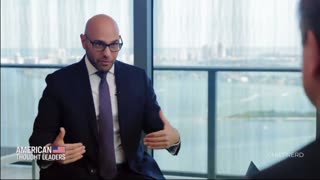 5:36
5:36
Asher Press
1 year agoSHOCKING: Hepatitis B vaccine testing had Only "147 kids, 5 DAYS monitoring, NO Control Group!
922 -
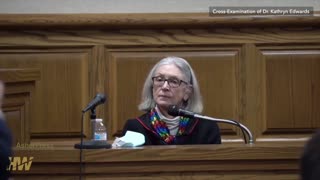 3:20
3:20
Asher Press
1 year agoAttorney Aaron Siri Cross-Examines Data Safety Monitoring Board Member for Pfizer COVID Vaccines
220 -
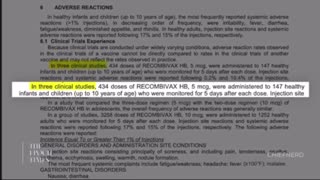 5:36
5:36
jess93
1 year agoLawyer Aaron Siri Exposed The Lack of Safety Data behind Hepatitis B Vaccines for Newborn Babies
82 -
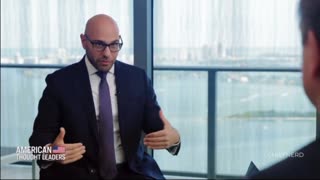 5:36
5:36
RedpillUSAPatriots
1 year ago🤯 SHOCKING: Aaron Siri Exposes the Lack of Safety Data Behind the Hepatitis B Vaccine for Newborns
6726 -
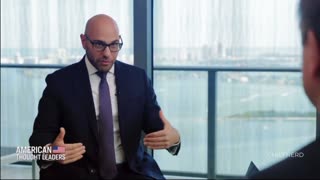 5:36
5:36
Chief Nerd
1 year ago🤯 SHOCKING: Aaron Siri Exposes the Lack of Safety Data Behind the Hepatitis B Vaccine for Newborns
83.7K25 -
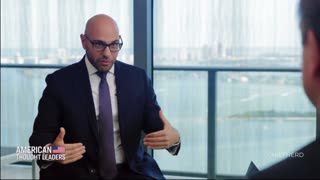 5:36
5:36
Libertarian Nullification
1 year agoSHOCKING: Aaron Siri Exposes the Lack of Safety Data Behind the Hepatitis B Vaccine for Newborns
115 -
![[ CLIP ] - Aaron Siri Unveils Protected CDC Jab Safety Data](https://hugh.cdn.rumble.cloud/s/s8/6/6/1/p/4/61p4f.0kob.jpg) 2:04
2:04
TheStarkNakedBrief
1 year ago[ CLIP ] - Aaron Siri Unveils Protected CDC Jab Safety Data
73 -
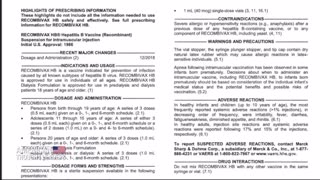 5:36
5:36
Q1776Q
1 year agoSHOCKING: Lack of Safety Data Behind the Hepatitis B Vaccine for Newborns
120 -
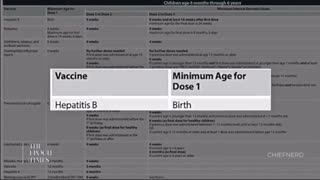 5:36
5:36
Rolling With You
1 year agoShocking proof the Hepatitis B vax (given to Every baby in USA on day of birth) testing had only:
44